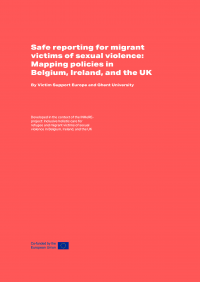Safe Reporting for Migrant Victims of Sexual Violence: Mapping Policies In Belgium, Ireland, and the UK

The present document describes and summarises national legislation and policies in Belgium, Ireland, and the UK with regard to reporting a crime to a competent authority by migrants, applicants for international protection and refugees (MAR) who have been sexually victimised (SV) and/or sex trafficked (ST).
In Belgium, the practical implementation of many legal tools falls under a ‘legal grey area’. Firewall measures, such as separating residence status from the crime reported, are not always effectively in place, hampering the willingness of undocumented victims of SV/ST to come forward. The public prosecutor, police officers, and their superiors play a critical role in assessing cases on an individual basis, leading to little certainty or clarity for MAR victims. In 2017, three holistic Sexual Assault Care Centre (SACC) centres were set up in Brussels, Ghent, and Liège. These centres have been positively received and proven to be an adequate solution to address specific needs of MAR victims of SV. Finally, raising awareness among all professionals who work with those victims is critical and must remain a priority for policy makers.
In the UK, various barriers exist when it comes to ensuring a safe reporting procedure. Data sharing between the police and immigration authorities is common practice, leading to possible deportation of undocumented victims of sexual violence. There is no mechanism to officially report a crime anonymously, and access to justice is therefore limited. Even though some measures are in place to enhance the safety of reporting, access to justice, and support, several NGOs and lawyers have called for a policy to treat undocumented victims first and foremost as victims and to set up a firewall between the competent authorities.
In Ireland, following the implementation of the Victims’ Rights Directive, a victim-centred approach has become prevalent, and a victim’s residence status does not play a role in their ability to lodge a complaint, nor is it asked about by the competent authorities. An Garda Síochána (the national police service in Ireland) has a policy of treating all victims equally, no matter their immigration status in Ireland, and provides extensive protections to victims of SV and ST. At the same time, virtually no protections exist for MAR victims specifically.
While over the past years the victim-centred approach has gained traction and led to various improvements in understanding victims’ needs and, therefore, creating adequate ways to respond to them both in legislation and in practice, there is still a long way to go until just and humane treatment is a reality for all MAR victims of SV/ST in the EU. Progress can be made by addressing existing gaps on various levels, from weaknesses in EU legislation to insufficient transposition into national law to the widespread lack of practical implementation of existing instruments.
